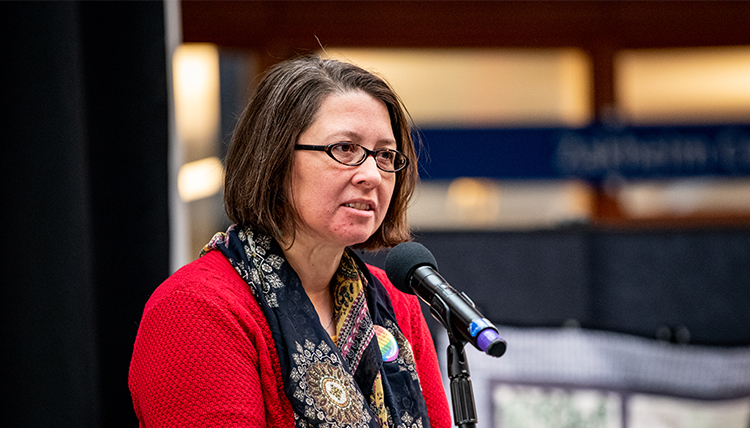Reframing Tolerance - Building a Just World

Gonzaga's Unity Multicultural Education Center held a ceremony recognizing International Day of Tolerance on November 16, 2018. Following is the address presented by one member of the Spokane community.
By Liz Moore, director
Peace and Justice Action League of Spokane
I’m honored to join you today on this Day of Tolerance. Let’s start by reframing. What we need to talk about is survival, resistance to oppression, dismantling systems and ideologies of dehumanization and exploitation, and shifting power from the elite so we all can thrive.
In our Peace and Justice Action League community, we are united in knowing that everyday people can accomplish extraordinary things together. And we are united in our commitment to building a just and nonviolent world, building beyond the moment through community organizing and grassroots leadership development.
Recently our Peace and Justice Action League community lost a member, Lu Brown, a professor of social work who often asked: What qualities are we being called to develop?
Right now I believe we collectively are being called to develop boldness, willingness to risk, and integrity. Brené Brown defines Integrity as choosing courage over comfort, choosing what is right over what is easy; practicing our values rather than simply professing them. Externally, this means speaking out and showing up.
Internally, this means cultivating authenticity in our imperfection and growth. This is important in racial justice work because, as Brene Brown says, “We can't talk about race without talking about shame. Because you can't talk about race without talking about privilege and when [white] people start talking about privilege, they get paralyzed by shame.” Getting paralyzed by shame lets structural racism roll on. Cultivating authenticity and seeking growth creates space for the courage of vulnerability, risk-taking, and learning — and that’s a key definition of effective activism and organizing.
"Choose courage over comfort;
choose what is right over what is easy."

We are called to develop humility. That means listening to the experiences, expertise, and solutions of impacted people. It means following impacted people.
We are called to develop community — which, as I have learned it, means: if you take one of us on — you take all of us on. In this time of escalated white nationalist ideology and white supremacist policy, warmongering, misogyny, and profit-driven exploitation of people and planet, we WILL find and create ways to defend each other.
And we are called to develop historical consciousness. Most of us are descendants of immigrants, many of whom courageously ventured into a new land to create economic security, unite their families, or escape war and strife. My great-great-grandfather was a fifteen-year-old German kid who came here to escape war and because he belonged with his family. Because he was European — white — I grew up on 300 acres of beautiful prairie that he bought in the same years as the Spokane Nation was removed from their homeland. For six generations my family has benefited from how my immigrant ancestors were granted access and rights others were denied. History is NOW. The ripple effects of our collective and individual choices NOW will also have impact for generations.
Racism is a strategy to divide us, to distract us while the wealthy few rig the rules to line their own pockets, then turn around and point the finger of blame at poor families, black people, Muslims, and Latinx immigrants. We say no. We say we will join together as we have in the past — black, brown, and white — to make our community, our world, and our campuses and organizations work for all of us.
Most important, and the way in to all these other qualities, is to choose courage over comfort; to choose what is right over what is easy. I urge you — and I am committed to doing my best, too — to walk shoulder-to-shoulder, creatively and tenaciously, following the lead of targeted communities with boldness, integrity, humility and historical consciousness so that we can build the road forward together.

Liz Moore is the director of the Peace and Justice Action League of Spokane, where she began her activism in PJALS' youth group as a Deer Park high school student after looking up “peace” in the phone book. She has worked as an organizer and educator in unions and community groups on issues including LGBT rights, racial justice, and worker rights. She is passionate about grassroots leadership development and supporting youth as leaders. In all that she does, Liz holds fast to the belief that everyday people have the power to build a just and nonviolent world.
The Center for Community Engagement, Center for Global Engagement, Chief Diversity Officer, Gonzaga Institute for Hate Studies, Gonzaga Student Body Association, Office of Mission and Ministry, and Unity Multicultural Education Center joined together to host Gonzaga’s tenth anniversary to observe the International Day of Tolerance.
